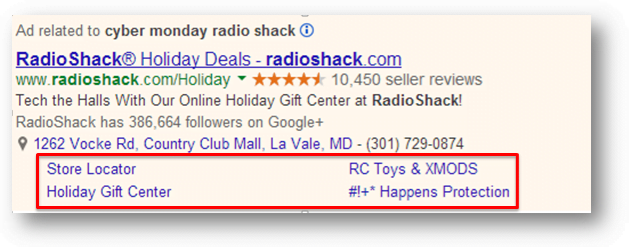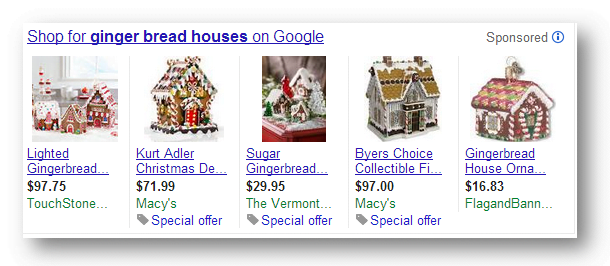I’ll be the first to admit it—it’s hard to buckle down and focus on PPC strategy during the holidays. Unfortunately, given that this is the biggest shopping season of the year, us PPC folks have to keep our heads down and power through. In the past few days, my teammates have shared tips on holiday planning, bidding and budget preparations, and ad text adjustments. For those of you that have mastered the basics and are ahead of the curve, let’s explore some advanced strategies you can apply to your account before you head out to enjoy the holiday cheer.
Ad Extensions
First things first, let’s talk Ad Extensions. Extensions have always been a great way to boost your performance and, due to a controversial update to the Ad Rank algorithm, they are now a critical component in all PPC campaigns. If you’ve not yet implemented these, it’s time to get busy. Otherwise, you may see your positions begin to decline, which could have dangerous implications during the competitive holiday season.
Now for the good news—Ad Extensions are relatively easy to set up, require minimal maintenance and can be implemented for free! Google offers a wide variety of extensions, so it is up to you to identify which are the best fits for your account. Keep in mind, you can enable as many as you like per campaign. Google will display the extension that they deem most relevant to the searcher. So, without further ado, let’s take a look at the extensions you should be implementing this holiday season.
RELATED: 8 Perilous PPC Mistakes to Avoid During the Holidays
Sitelink Extensions
These extensions really should appear in almost every advertiser’s account. As you can see from the example, sitelinks allow you to include additional lines below your text ad linking to your website. Not only does this allow you to give searchers the ability to choose exactly what they want to see, but it also boosts the size and overall prominence of your ad.
You should enable sitelinks year round. During the holidays, be sure to adjust your links labels to include holiday-specific terminology. If you really want to impress your searchers, link to holiday themed landing pages. If you’ve already incorporated sitelinks but you are looking to take them to the next level, remember that Google recently released the option to enable ad group sitelinks, day parting for sitelinks and mobile specific sitelinks. You can also experiment with enhanced sitelinks, which allow you to add text below each link. Google just keeps giving this holiday season!
Call & Location Extensions
While you do not need to tweak call and location extensions to reflect the holiday season, it is critical that they are enabled because they encourage shoppers to interact with your company.
As you can see from this image, call extensions make telephone information readily available within the ad text. On mobile phones, they are displayed as a click-to-call button and on desktops, the full number will appear. If you want to track calls derived from AdWords, you have the opportunity to enable a Google call forwarding number.
Location extensions are beneficial to local advertisers who have brick-and-mortar storefronts that they want to drive traffic to. For these, all you have to do is plug in your address.
Review Extensions
Google seems to be perpetually testing ad extensions, so we are likely to see many new formats come to light in the next few months. Keep an eye out for new gems this holiday season. If you see one that you are interested in implementing, reach out to your AdWords representative. If the beta is still open, they can give you an idea of the requirements and help you apply.
Review extensions are the most recently released extension in AdWords. As you can see, they give advertisers the opportunity to incorporate a third-party review within their ad text. Since AdWords rarely permits the use of superlatives in ads, this is a great opportunity to brag about your company!
Product Listing Ads
If you are in the e-commerce space, it is imperative that you enable Product Listing Ads. These ads include product images, along with their pricing, merchant name and a direct link to the specific product page. To enable PLAs, one must establish a Google Merchant Center account. Google will automatically select the most relevant product to show, based on the search query. Much like typical search ads, these can be charged on a cost-per-click, conversion-focused or CPA percentage basis. (Note that Google will be transitioning all PLAs to Shopping Campaigns in 2014.)
As you hone your Product Listing Ads for the holiday season, here are a few tips to keep in mind:
- You can create a promotional feed for key shopping days focused on your best selling items.
- Avoid using stock images because they could look the same as others. Instead, aim to use unique images that will help you to stand out against competitors.
- PLAs are now mobile-friendly! Since so many people use their mobile devices while shopping, Google updated the presentation of mobile PLAs. Searchers can now swipe to see more products in this ad unit.
Dynamic Remarketing
Chances are, you’re already running a remarketing campaign. If you are an e-commerce advertiser, kick your remarketing efforts up a notch by experimenting with Google’s new dynamic remarketing. This program automatically creates customized ads and presents them to anyone who has visited one of your product pages in the past. These highly targeted ads encourage past visitors to return and view products they visited in the past, or similar products they might like.
For the time being, this feature is fairly limited. It is only available to retailers with Google Merchant Center accounts and the ad formats are very basic. As you prepare your Dynamic Remarketing campaigns for the holiday seasons, your best bet is to ensure that you have created optimal ads. I recommend testing a variety of ad layouts, button colors and calls to action to see what resonates the most with your target audience.








0 Comments